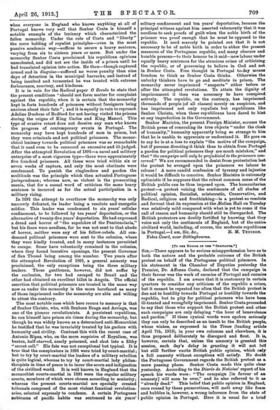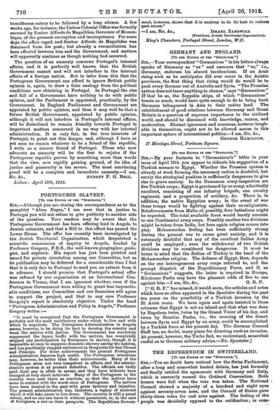[To THE EDITOR. Or THZ "SPECTATOR"] Sru,—There appears to be
serious misapprehension here as to both the nature and the probable outcome of the British protest on behalf of the Portuguese political prisoners. In his statement in the Chamber of Deputies yesterday the Premier, Dr. Affonso Costa, declared that the campaign in their favour was the work of enemies of Portugal and enemies of the republic. I am aware that it is customary in certain quarters to consider any criticism of the republic a crime, but it cannot be repeated too often that the British protest is due not to hostility towards Portugal or hostility towards the republic, but to pity for political prisoners who have been ill-treated and wrongfully imprisoned. Senhor Costa proceeded to say that those who support the British protest and other such campaigns are only delaying "the hour of benevolence and pardon." If these cynical words were spoken seriously they can only be described as an insult to the British people, whose wishes, as expressed in the Times (leading article April 7th, 1913), in your own columns and elsewhere, it is thus proposed deliberately to disregard and flout. It hi, however, certain that, unless the amnesty is granted this session, each day's delay in granting it will not lull but still further excite British public opinion, which only a full amnesty without exceptions will satisfy. No doubt the Portuguese Government regards the British protest as a mere passing phase. Senhor Costa made this quite clear yesterday. According to the Diario de Noticias' report of his speech his words were : "The campaign [in favour of an amnesty] will soon be over," and he also referred to it as "already dead." This belief that public opinion in England, once roused by these persecutions, will melt away like foam and bubbles is, however, a wrong inference from the state of public opinion in Portugal. Here it is usual for a brief tumultuous outcry to be followed by a long silence. A few weeks ago, for instance, the Lisbon Colonial Office was formally accused by Senhor Alfredo de Magalhiles, Governor of Mozam- bique, of the grossest corruption and incompetence. For some days the affair raged, and Senhor Alfredo de MagaIhies was dismissed from his post ; but already a reconciliation has been effected between him and the Government, and matters will apparently continue as though nothing had occurred.
The question of an amnesty concerns Portugal's internal affairs, and it is perfectly well known that the British Government cannot and will not interfere in the internal affairs of a foreign nation. But to infer from this that the Portuguese Government can afford to ignore British public opinion is, again, to draw a false analogy from the political conditions now obtaining in Portugal. In Portugal the rise and fall of a Government have nothing to do with public opinion, and the Parliament is appointed, practically, by the Government. In England Parliament and Government are appointed by public opinion, and thus it may well be that a future British Government, appointed by public opinion, although it will not interfere in Portugal's internal affairs, will be disinclined to remain friendly towards Portugal in important matters concerned in no way with her internal administration. It is only fair, in the true interests of Portugal, to point out this danger, and, although I have as yet seen no reason whatever to be a friend of the republic, I write as a sincere friend of Portugal. Those who now advocate an amnesty will be the first to rejoice if the Portuguese republic proves by something more than words that the view, now rapidly gaining ground, of its idea of justice and generosity is too severe. The most convincing proof will be a complete and immediate amnesty.—I am,
Lisbon. : April 19th, 1913.



























































 Previous page
Previous page